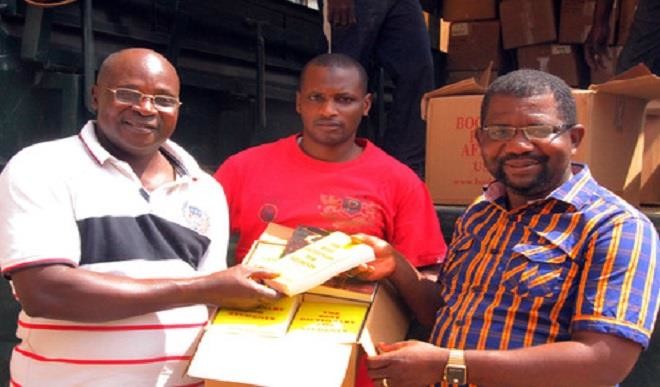Prison reforms: NGO donates books to inmates
Efforts to rehabilitate, reform and reintegrate inmates in Nigerian prisons received a boost on Saturday when a justice sector reform organization, the Citizens United for the Rehabilitation of Errants (CURE), donated books to the Nigerian prisons. The books are in various subjects such as Mathematics, English, Biology, Chemistry, History, Geography, Religion, Physical Education, and Agricultural […]


Efforts to rehabilitate, reform and reintegrate inmates in Nigerian prisons received a boost on Saturday when a justice sector reform organization, the Citizens United for the Rehabilitation of Errants (CURE), donated books to the Nigerian prisons.
The books are in various subjects such as Mathematics, English, Biology, Chemistry, History, Geography, Religion, Physical Education, and Agricultural Science.
There were also books on professional fields and disciplines such as Law, Sociology, Psychology, Medicine, Engineering, Meteorology, and Journalism.
The books, which are over 35,000 and packed into 550 cartons, were donated by the Australian Government and the Books for Africa Foundation. The books are expected to be distributed to prison facilities in 19 states of the federation.
In a brief presentation before the books were loaded onto a truck of the Nigerian Prison Service, the coordinator of CURE, Sylvester Terhemen Uhaa, said his desire for the welfare and rehabilitation of prison inmates was his major driving factor.
He said since many prison inmates were studying for external ordinary level examinations like NECO and WAEC, while others were already students of the National Open University of Nigeria (NOUN), the books would assist them in their preparations and research.
“The donation of these books represents a very high moment for me and our organization. We are giving to the prisons what they had yearned for. We are happy that the federal government and the prisons have indicated desire to make judicious use of the books,” Uhaa said.
On how to monitor the utilization of the books, he said the organization would set up a monitoring team to ensure they are being used for the inmates.
“We do not want to see them in private libraries and markets but in the prisons,” he said. “By collecting them you are accepting responsibility to put them to use.”
He also stressed the need to improve the welfare of prison inmates to assist in the reading culture.
While receiving the books, a Deputy Chief Inspector of Prisons and officer-in-charge of library at the prisons headquarters in Abuja, Iliya Haruna Goni, promised that the prisons would make judicious use of the books.
“We are going to distribute the books to some commands and training institutions of the prisons. On behalf of the Controller General, we say it is a wonderful thing we have these books,” he said.
“It is a pleasure to have an NGO like come to our help in time of need. It is commendable and we appreciate any NGO that can add value. We will ensure these books will not be sold out,” he added.
